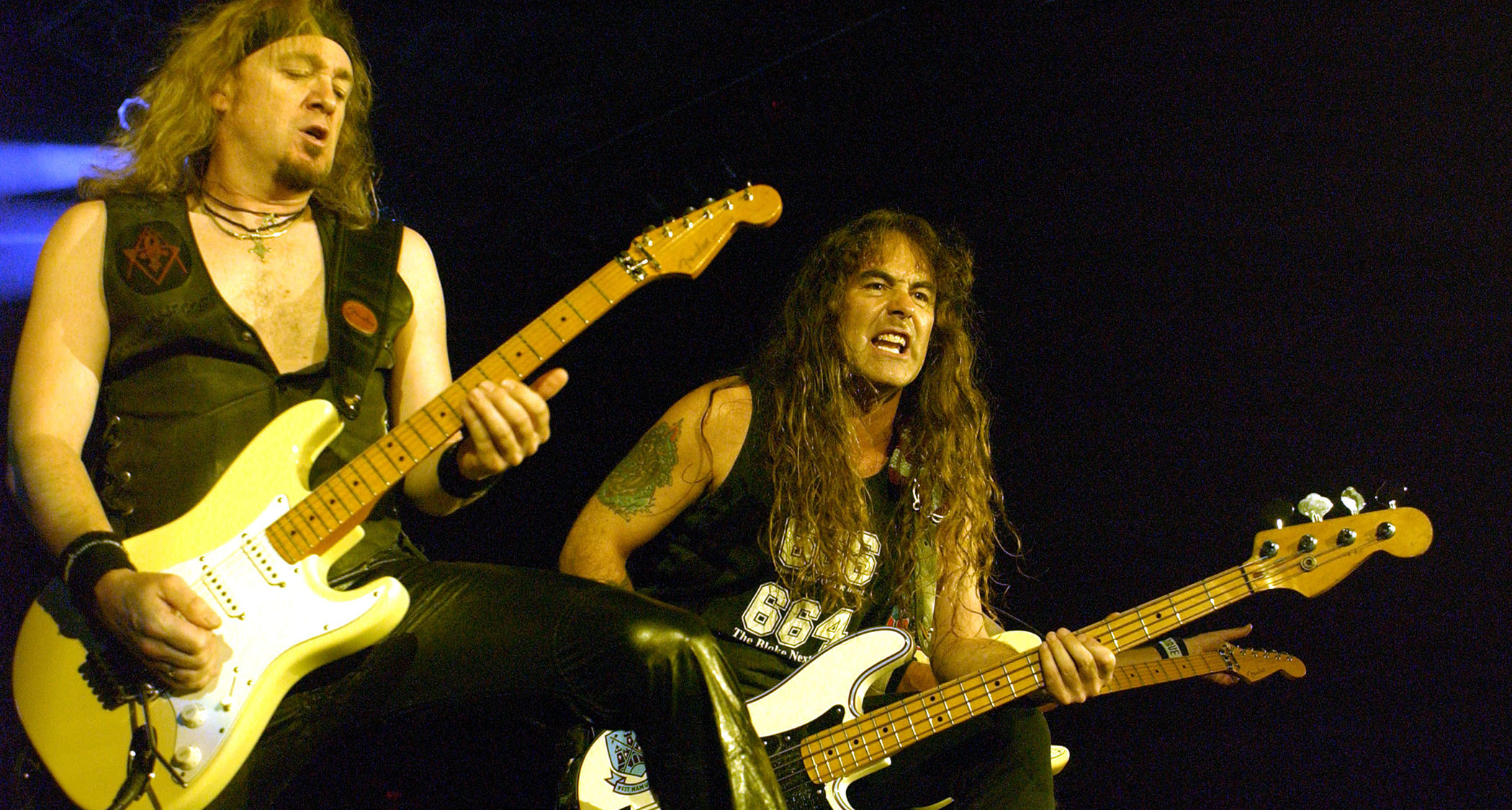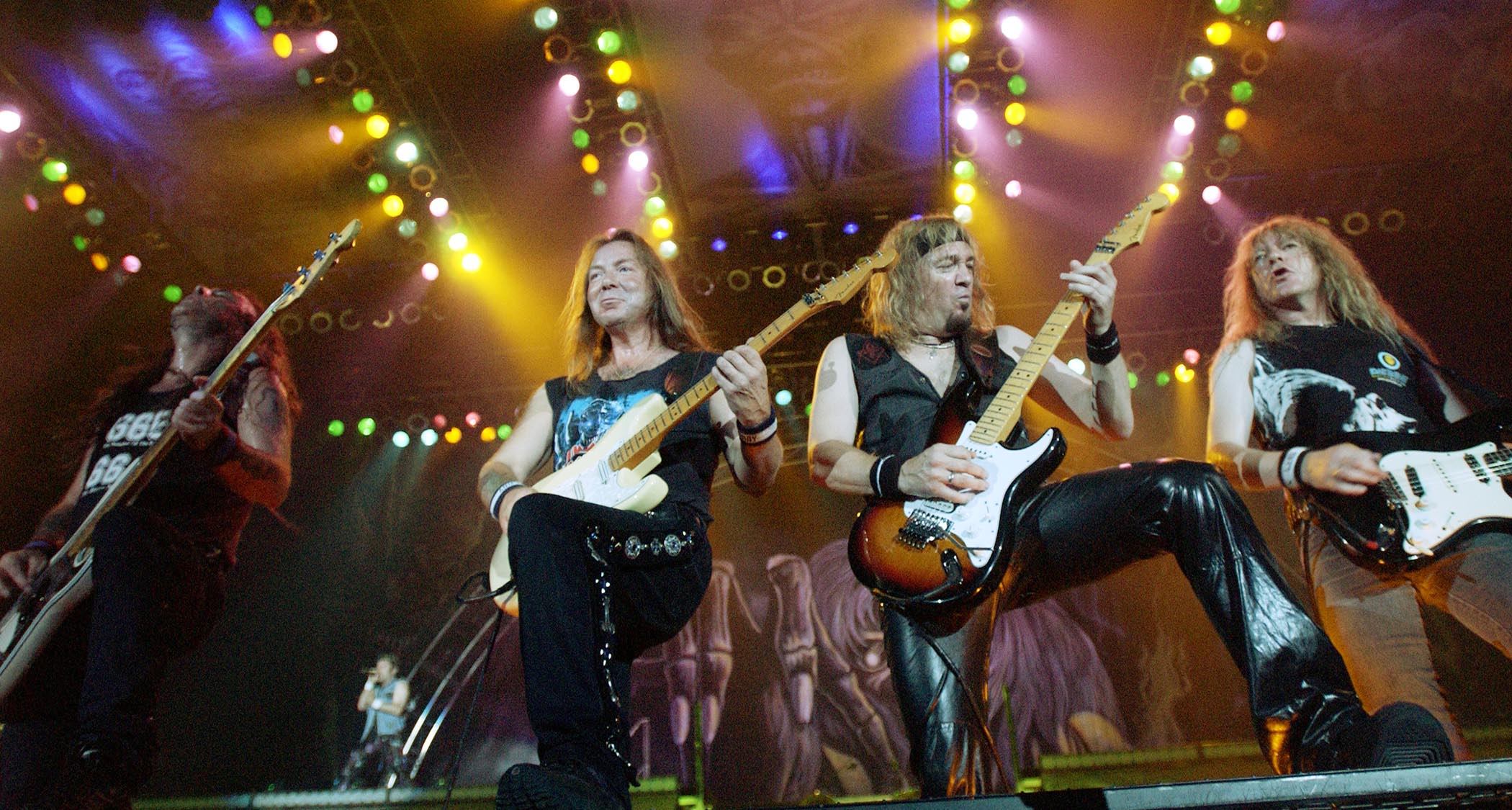“Although it might not feel natural, when you translate what he does for guitar, it sounds different”: Adrian Smith on how Steve Harris is the secret to Iron Maiden’s triple-guitar attack – and the prog instincts driving their sonic evolution
When your principal songwriter and driving force is directing traffic on bass, is it any wonder the guitars took a different path in search of brave new worlds to explore?

Want all the hottest music and gear news, reviews, deals, features and more, direct to your inbox? Sign up here.
You are now subscribed
Your newsletter sign-up was successful
The signs were there from the very beginning that Iron Maiden were not going to be just another NWOBHM band.
They had the gnarly logo. They had Eddie, their undead mascot, and in Derek Riggs, Eddie's creator, they had found the artist to give them the visuals to match their sound – and what a sound.
Iron Maiden shared the urgency of their peers, but, crucially, their self-titled debut – replete with boisterous metal guitar anthems – also seeded progressive grace notes that foreshadowed a radical musical evolution that took them from tracks like the on-the-lam metal riot of Running Free to long-form blockbuster epics such as Paschendale, the Jethro Tull-inspired Blood Brothers, and the Rime Of The Ancient Mariner, which reimagined Coleridge’s poem as a 13-minute oceanic nightmare.
Looking back, no one could have foreseen Iron Maiden’s success, their commandeering of the world’s stadia and the sheer cultural weight of their popularity. Here is a band who has their own plane – Ed Force One – their frontman, Bruce Dickinson, on occasion piloting it. They’ve come a long way from the Cart & Horses.
As iconic British institutions go, Iron Maiden are as recognisable as the BBC, the NHS and Boots the chemist.
But in 1980, those really paying attention to what founder, bassist and chief songwriter Steve Harris was doing with the scale and theatre of a track like Phantom Of The Opera – the sheer musical audacity of it all – would have recognised that Iron Maiden was not business as usual.
Phantom Of The Opera was a tell that Harris had a grander vision.
Want all the hottest music and gear news, reviews, deals, features and more, direct to your inbox? Sign up here.
What was spawned under the nightmarish sulphur yellow street lamps of urban Britain would soon expand beyond the seven seas and the Pyramids and Sphinx of Giza, and to – and why not? – Outer Space as Iron Maiden’s preoccupations with sci-fi, fantasy and the darkest chapters in world history give them the narrative room their super-sized arrangements needed.
Harris’ path to Iron Maiden was cleared by his own musical ambition. He had been having a great time in a band called Smiler, playing with a bunch of guys who were a little older than him, learning the ropes, until he realised his creative appetites were a little too exotic for his bandmate’s tastes.
“When I started writing my own stuff, it was with a lot of combinations and time changes and power,” said Harris, speaking to Classic Rock in 2023. “I wanted to do my first real song with Smiler, but when I brought it to them, they said: ‘Oh shit, this has too many time changes. We’re not bloody doing this!’ I couldn’t handle that attitude, so I left and formed Iron Maiden.”
People said that Maiden had this ‘punk’ thing, but everyone knows I don’t like punk at all
Those formative tracks Smiler rejected would take on a second life with Maiden. Burning Ambition, the B-side to Running Free, was the first song he ever wrote. The opening riff to Innocent Exile, from Killers, was written for Smiler. Harris was learning fast. He, and Maiden, did everything fast.
Many would listen to Iron Maiden’s debut and its 1981 follow-up, Killers, and attribute the speed and tempo to punk’s influence – and perhaps Maiden’s then-frontman Paul Di’Anno, with his pugnacious delivery, gave them that impression, too. Harris says all of that is a misdirection.
Over the years he has made it no secret that it was prog not punk that excited him as a teenager. The energy? Well, how could it not sound energetic? He was in his early twenties playing metal.
“People said that Maiden had this ‘punk’ thing, but everyone knows I don’t like punk at all, so it’s not that,” he said, reflecting on 50 years of Iron Maiden with Classic Rock. “At that age you’re full of energy, and that’s what you want to come through, but with loads of melody. That’s why I wanted twin guitars.”
As a bass player, I don’t write or play like a guitarist would. And with Phantom it was obvious that my style of writing was very different to what people were used to
Those guitars were deployed differently, too. Some metal bands use guitar as blunt instruments, the hammer-smashed-face sensibility that sees riffs as bludgeons. Maiden’s guitars are a stiletto – the flash of the blade, if you will. They’re agile, animated by Harris’ nimble basslines, almost exclusively performed on is Fender Precision Bass, set up with a set of heavy gauge flatwound bass strings.
There is a story that a roadie once picked up Harris’ bass and hit the strings hard with a pick, blowing the speakers, and it might be apocryphal, possibly exaggerated, but it speaks to how Harris has his bass rig set up. His fingerstyle melodic gallop is what gives Maiden its forward motion. Harris told Bass Player in 2012 that the volume was necessary.
“I have to be pretty loud to cut through the guitars," he said. But I've actually cut back a lot; it's not as loud as it used to be. All I’ll have in the monitors is a bit of kick, snare, and toms. And there are points in the set when I'll come back to my little space onstage next to my amp. I like having my own pocket of sound.”
It doesn’t matter which era of the band we are talking about, whether it is Dennis Stratton and Dave Murray on guitar, Dave Murray and Adrian Smith, Dave Murray and Janick Gers or the millennial-redux lineup from Brave New World onwards of Smith, Murray and Gers, when Harris writes on guitar, there is something in the translation that makes it wholly unique. That is why Phantom Of The Opera sounds like nothing else, setting Maiden on a path that other bands were not capable or willing to follow.
“As a bass player, I don’t write or play like a guitarist would,” said Harris. “And with Phantom it was obvious that my style of writing was very different to what people were used to, and what guitarists were used to. My songs were unusual, a bit quirky, but it felt natural to me.”
“That’s a thing that’s gone all through the years. Steve is main songwriter, and as a bass player he has a pretty unique way of playing,” says Smith. “So when you translate that to the guitar, it's just something you would not do on guitar, normally, which is a double-edged sword, because although it might not feel natural, when you translate what he does for guitar, it sounds different.”
Even Harris’ choice of keys is unorthodox. He will pitch them higher. Again, this is Iron Maiden using the electric guitar as a rapier.
“He did a lot of songs in D, and D is not a really heavy key,” says Smith. “The Number Of The Beast, Run To The Hills, it’s not a heavy key, and I think if we did it now I’d suggest we did a different key, or we’d try different tunings, but at the time you just go along with it.”
Most other metal bands writing in D would probably have tuned down. Maiden stay in standard tuning. Harris’s choices make sense. In Dickinson, he has a singer with the vocal range that can work with a higher key.
And with three guitars in the band, all precise, kinetic,playing in unison, having them play in a higher key makes it easier for Murray, Gers and Smith to complement each other, not only harmonising and working on melodic counterpoints but doing so without cluttering the mix.

Can you imagine Metallica with a third guitarist, or Black Sabbath with three guitars, all those low frequencies, all that mud? Harris’ stylistic choices give Iron Maiden a clarity that allows them to foreground melodies, either from the guitars or the operatic boom of Dickinson’s voice, but also, almost always with the bass.
All these years of listening to Maiden, it’s hard to think of a significant musical passage –besides the the Hallowed Be Thy Name intro – where Harris spends much time on his low E string. He is all action, ascending into the upper registers, taking his cues from Chris Squire of Yes.
Speaking to Prog magazine in 2022, Harris says his musical awakening came when he discovered King Crimson, Genesis, ELP and Jethro Tull all around the same time – he would play chess at his friend’s house, and his opponent would put a prog LP on the turntable as interference. It worked. They commanded Harris’ attention.
“All the bands were incredible. They had great songwriting, great musicianship, the whole kitchen sink, you know? I just loved it,” said Harris. “The early Genesis stuff used to give me goosebumps. Take A Pebble by ELP too. Amazing stuff. I remember seeing Jethro Tull on Top Of The Pops for the first time. My mum hated it, which I thought was great [laughs]. But I didn’t like it just because of that. I just fell in love with that kind of music.”
This was the ‘70s. Harris’ musical curiosity came of age just as rock bands dared to dream bigger about what their sound could be, exploring more exotic scalar patterns than the pentatonic and blues scales, counting past 4/4.
“I couldn’t believe that there was so much great music around,” Harris continued. “Looking at it now, I feel I was really lucky to grow up in that era when some of those bands were given carte blanche to just do what they wanted to do.”
That was the lesson he took from them all.
“It just taught me to do whatever the hell you want to do and to go in any direction you want to,” he said. “That’s a pretty good lesson. And it’s all about the songs, at the end of the day.”
Not that Harris approved of all these bands’ artistic decisions. A Genesis superfan who had the original Nursery Crime/Foxtrot-era logo on the back of his denim jacket, he was dismayed when they changed their logo, and swore never to do that with Maiden. And he didn’t. But then he had bigger fish to fry.
- Catch Smith, Harris, Eddie and the boys on the Run For Your Lives World Tour. See Iron Maiden for dates and ticket details.
Jonathan Horsley has been writing about guitars and guitar culture since 2005, playing them since 1990, and regularly contributes to MusicRadar, Total Guitar and Guitar World. He uses Jazz III nylon picks, 10s during the week, 9s at the weekend, and shamefully still struggles with rhythm figure one of Van Halen’s Panama.
- Paul ElliottGuitars Editor
You must confirm your public display name before commenting
Please logout and then login again, you will then be prompted to enter your display name.

![Iron Maiden - Running Free (En Vivo!) [HD] - YouTube](https://img.youtube.com/vi/lVN_fZCiTAM/maxresdefault.jpg)
![Iron Maiden - The Trooper (En Vivo!) [HD] - YouTube](https://img.youtube.com/vi/-QEb0iZ9uxc/maxresdefault.jpg)




